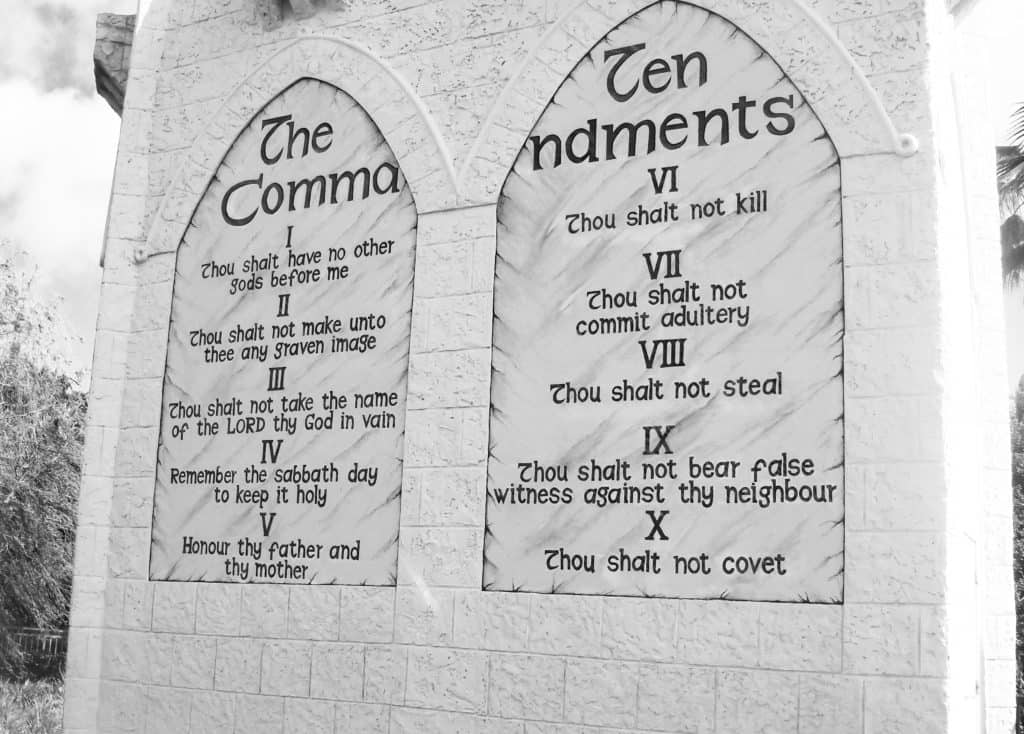
The Bible was written thousands of years ago. Is it still relevant to your day-to-day life?
You might be surprised how immediately applicable its spiritual principles can be. All it takes is a little study and reflection.
If you asked a history teacher why it’s important to study history, you might hear something like, “So we won’t repeat our past mistakes,” or “To understand why things are the way they are.”
Sure, studying history can feel like reading a bunch of old news. But a closer look at past events can reveal different aspects of human nature. It can teach us valuable lessons about group behavior and cause and effect. We learn what people have tried before, why they tried it, and if it worked or not. Then we can plan for the future accordingly.
The Bible is like one big history book, useful for those same reasons. The bonus is that the Bible includes a perspective no other history book has.
The lessons in the Bible are a promise from God Himself that living a Christ-centered, Bible-based life can benefit you here and now… and also eternally.
Here’s an overview of how the Bible can provide guidance and add purpose to your life even today:
- The Bible Tells Us Who We Are
- The Bible Tells Us What To Do (In Principle)
- The Bible Tells Us Why We Should Do What It Says
- The Bible Tells Us How to Do What It Says
Start your own Bible study today!
Sign up for Bible study lessons!

The Bible tells us who we are
The Bible says we are “children of God.”((Genesis 1:24-28; John 1:12; 1 John 3:1; Matthew 5:9; Romans 8:14)) But what does that really mean? The Bible tells us that, too.
Let’s unpack this statement: We are children of God.
Knowing the answer to this question is also an important part of who we are.
God is the all-loving, all-knowing, all-powerful creator of the universe, and He is also our Savior, through His Son, Jesus Christ. God created us in His image1 and wants to be with us daily—like the way things were in the beginning.
When God created the first humans, Adam and Eve, He spent every day with them. He walked with them and talked with them in the Garden of Eden. Just as children belong to their parents, so Adam and Eve belong to God.
God knew they would “grow up” and need to make decisions for themselves. And like any loving parent, God granted Adam and Eve that freedom and chose to love them unconditionally—no matter what decisions they would make.

And up until then, everything was perfect. But somebody got jealous.
The Devil, or Satan, wanted to be God. He was an angel who rebelled against God and was cast out of heaven. He became the “father of lies”(( Ezekiel 28:12, 15, 17; Isaiah 14:12-17; Revelation 12:7-12)) and began his “work” on Adam and Eve.((Genesis 3))
You may already know this story well.
The Devil appeared as a beautiful, shiny serpent. He told Eve if she ate the fruit from the tree God told them not to eat of, she would become “like God.”
Here’s the thing, though: The way in which the fruit would make her “become like God” would be by “knowing both good and evil.”
Before then, Adam and Eve had only known what was good. There was no sin in the world.
But the Devil tempted them by saying there was more to life than what they knew. There was something they weren’t told about, something off-limits. And that was the beginning of doubt—of selfishness and entitlement.
Does that sound familiar? Does that sound like our world now? Selfish and entitled?
Although the world is a mess right now—and has been for a long time—it helps for us to remember, we were originally created as perfect beings…in God’s “own image!”2 But He also created us with free will, so we wouldn’t just be His robots. To truly be human means to have the power of choice.
And with this power of choice, we are susceptible to temptation.The consequence of sin is death.((Romans 6:23)) Yet Jesus experienced death in our place so we could live. Jesus made the choice to show us God’s infinite love by taking the deadly consequences of our rebellion and overcoming the darkness that leaves us empty, fearful, and unsatisfied. Then He was resurrected in three days to show God’s power over death and sin.
“For God so loved the world that He gave his only son, that whoever believes in Him shall not perish but have eternal life.
“For God did not send His Son into the world to condemn the world, but in order that the world might be saved through Him.
“Whoever believes in Him is not condemned, but whoever does not believe is condemned already, because he has [chosen!] not to believe in the name of the only Son of God” (John 3:16-18, ESV).
God loves His created children so much that He was willing to face the worst possible suffering just to save us from being lost forever.
This is key in the story of humanity as a whole. The core of the entire Bible and the plan of salvation have to do with who we are, and who God is.
We are children of God with free will. We are loved by the One who is love (1 John 4:8).
Yes, we may have fallen away from the Almighty God, but we are still His children.
Yes, we are marred.
Yes, sin has tainted us because of the way we used our free will.
But we are also redeemable!
We are children of God who now have a tendency toward sin, but we can be redeemed if we choose God. When we believe Jesus died to save us, God will redeem us.

But what does it have to do with our lives today? What does it have to do with you waking up, making breakfast, going to work or school, dealing with an illness or a tragedy or a difficult person in your life?
Think about it. This profound perspective can be a game changer.
Might you regard yourself differently if you consider that you’re a child of God, and He wants to redeem you? That you’re worth dying for? And there is a way for you to get out of this mess, simply by continuing to choose God, day by day?
Often the way we perceive ourselves affects the decisions we make each day.
Taking this a step further, might you regard others differently when you consider they are also children of God, and He wants to redeem them too?
“Instead [God] is patient with you, not wanting anyone to perish, but all to come to repentance” (2 Peter 3:9, NRSV).
While the creation and fall of mankind was a long, long time ago, its meaning is timeless. You know who you are, what you’re worth, and that you have the power (and gift) of choice each day of your life.

The Bible tells us what to do (in principle)
God gave us the Bible so we could know how to be faithful to Him. His word gives us general guidelines that are applicable regardless of time, place, or person.
Now that we know beyond a doubt we are God’s children, this can influence our daily lives, our self-worth, our relationships, and so much more.
But wouldn’t it be nice to have some specifics? What kinds of things should we do with this new perspective?
Fortunately the Bible is helpful here, too. While the culture was vastly different at the time it was written, humanity was dealing with the same struggles that persist today: pride, greed, guilt, hate, fear, etc.
All those struggles are the same sin, just wearing different clothes. Each one represents a form of selfishness—valuing one’s own life and preferences above others’ and choosing (there’s that word again…) that same self-interest over God’s loving guidance.
It’s not just in Genesis; the whole Bible is about choice. It’s like a reference book to help us make better choices each day.
In Exodus we have the Ten Commandments—probably the most famous “rules” in the Bible.((Exodus 20:1-17)) That’s understandable, since many of today’s laws reflect those same principles.
Don’t steal, don’t murder, don’t cheat on your spouse… those are all commandments. And that’s a good start. Following those will certainly help keep you out of trouble.
Want to learn how God’s principles can also help you find freedom, hope, and healing in your life today?

But the rest of the commandments take things a bit deeper. They reflect where God’s place should be in your life, how you should regard your family, and an invitation to experience the blessing of the Sabbath.
You’ll also find applicable principles in other parts of the Bible throughout your studies.
Take Micah 6:8 for example:
“He has shown you, O man, what is good; And what does the Lord require of you but to do justly, to love mercy and to walk humbly with your God?” (NKJV)
This simple passage can aid us in our decision-making process.
Think about your last tough situation. What were some of the decisions you made? What influenced those choices? Did you make those choices in terms of what was just, yet also merciful and humble? This mental practice alone can make a difference in your spiritual growth.
Here’s another good one:
“Jesus said to him, ‘You shall love the Lord your God with all your heart, with all your soul, with all your mind. This is the first and great commandment. And the second is like it: You shall love your neighbor as yourself. On these two commandments hang all the Law and the Prophets’” (Matthew 22:37-40, NKJV)
Just think how much better the world could be if we all chose daily to put God first and love our neighbors. It could affect everything from how you treat your spouse the morning after a big fight to how “eagerly” you merge your car onto a busy highway.
This passage gets into a recommended attitude toward life:
“He has made everything beautiful in its time. … I perceived that there is nothing better for them [humanity] than to be joyful and to do good as long as they live; also that everyone should eat and drink and take pleasure in all his toil [work/career], for this is God’s gift to man” (Ecclesiastes 3:11-13, ESV).
How refreshing is that? One of the things recommended in the Bible is to sit back and enjoy the simple things in life. King Solomon wrote that during a reflective time of his life, after realizing that chasing after wealth and power was ultimately meaningless.
And throughout history, even within recent years, other well-known public figures have declared this realization time and time again, even hundreds and thousands of years after Solomon’s time.
Even though the world was a different place during Bible times, the takeaways are the same. God’s guidelines are timeless principles, not a list of specific do’s and don’ts. We are free to make our daily choices based on the principles demonstrated in the Bible.

The Bible tells us why we should do what it says
The Bible says in multiple places that those who believe in God and strive to do His will are given eternal life. (Romans 10:9-20; Acts 16:30-31; John 5:24; Revelation 3:20). They get to go to heaven and hang out with God in a perfect world.
But is that it? Are we only supposed to do good so we’ll be saved?
As you might have guessed, there’s a bit more to it.
The Bible gives us guidance for life today because today matters—for you, for God, and for everyone around you.
While there is no promise of a perfect life, the lessons in the Bible are meant for your benefit. That’s why Jesus said, “…I have come that they may have life, and that they may have it more abundantly” (John 10:10).
God offers the fruits of His Spirit—love, joy, peace, patience, kindness, goodness, faithfulness, gentleness, self-control((Galatians 4:22-23)) —to those who choose Him daily.
What’s more, when considering what Jesus has done for us, it only makes sense to live a life enriched with gratitude. In response to God’s love, we strive to love one another. This is the key to freedom, healing and hope.((Galatians 5 and 6))

Colossians 3 touches on this concept:
“So if you have been raised with Christ, seek the things above, where Christ is, seated at the right hand of God. … But now, put away all the following: anger, wrath, malice, slander, and filthy language from your mouth. Do not lie to one another, since you put off your old self with its practices and have put on the new self. You are being renewed in knowledge according to the image of your Creator. …
“Therefore, as God’s chosen ones, holy and dearly loved, put on compassion, kindness, humility, gentleness and patience, bearing with one another and forgiving one another if any has a grievance against another. Just as the Lord has forgiven you, so you are also to forgive. Above all, put on love, which is the perfect bond of unity.” (verses 1, 8-10, 12-14, CSB).
When Jesus took our punishment upon Himself, it was as if our bondage of sin died with Him. We can put away who we were before. All that matters is who we are now, and Who we are choosing to live for.
The Bible encourages us to dedicate ourselves as living sacrifices,((Romans 12:1-2)) meaning we demonstrate our love for God, and our gratitude for what He has done for us, by the way we choose to live each day.

The Bible tells us how to do what it says
When it comes to day-to-day life, we can count on God to help us tackle the challenges that come our way by engaging in prayer and reading the Bible.
And praise God for His help because we are powerless on our own to do good.
Our choice long ago, in the Garden of Eden, meant we have to face both good and evil constantly. The apostle Paul describes what this is like in Romans 7. And thankfully—even though Paul described how frustrating it can be to make the best choice—he ends it with a promise of deliverance:
“For I do not understand my own actions. For I do not do what I want, but I do the very thing I hate. … it is sin that dwells within me. For I know that nothing good dwells in me, that is, in my flesh. For I have the desire to do what is right, but not the ability to carry it out. … Who will deliver me from this body of death? Thanks be to God through Jesus Christ our Lord! …” (Romans 7:15-25, ESV)

Yes, the Bible is an old, old book. But clearly, we humans haven’t changed much at all, despite the progression of knowledge and culture throughout the ages.
Above all, the Bible teaches us how to love God and love others—and how to accomplish that in thought, word, and deed.
And that will always be relevant.
Find out how studying the Bible can lead you toward an abundant life!
Sign up for Bible study lessons.